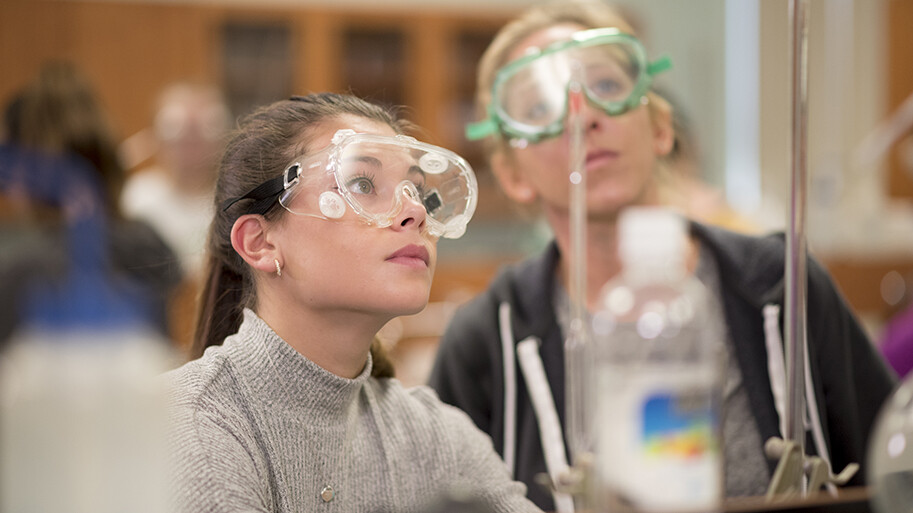The Lourdes University Department of Chemistry and Physical Sciences offers a minor in chemistry. The chemistry curriculum can strengthen the scientific skills and foundation of pre-professional concentrations, including those pursuing careers in dentistry, medicine, occupational therapy, physical therapy, physician assistant, and veterinary science. It also lays the foundation for students pursuing careers in biological sciences, health sciences, forensic science, pharmaceuticals, and engineering.

Chemistry
Minor
Chemistry, as a pure science, explores the nature and transformation of matter. As an applied science, it seeks to provide society with the knowledge and tools to tackle pressing social problems. Knowledge of chemistry aids students in understanding the technological society in which we live.
Courses in chemistry and the physical sciences engage students in a dynamic, challenging, and integrated study of chemical and biological principles necessary to develop scientific literacy and critical thinking skills. Through various supportive learning modes, students develop the knowledge, skills, attitudes, and values that enable them to become successful professionals and scientifically responsible citizens.
Plan of Study
CHEMISTRY MINOR
Total credit hours: 20
The Department of Chemistry and Physical Sciences offers a minor in chemistry. The Chemistry Minor can strengthen the scientific skills and foundation of students in pre-professional concentrations.
In order to successfully complete a minor in chemistry, students must:
- Fulfill 20 credit hours of chemistry (CHM) course requirements from the list below.
- Earn a minimum grade of C (2.0) in all courses within the Chemistry Minor.
REQUIRED CURRICULUM
Choice of 20 credit hours from the following courses:
CHM 181 General College Chemistry I
CHL 181 General College Chemistry I Lab
CHM 182 General College Chemistry II
CHL 182 General College Chemistry II Lab
CHM 301 Organic Chemistry I
CHL 301 Organic Chemistry I Lab
CHM 302 Organic Chemistry II
CHL 302 Organic Chemistry II Lab
CHM/CHL 304 Physical Chemistry
CHM 305 Basic Biochemistry
CHL 305 Basic Biochemistry Lab
CHM 306 Environmental Chemistry
CHL 306 Environmental Chemistry Lab
CHM 311 Clinical Pharmacology
CHM 499 Topics in Chemistry
Placement Tests
Chemistry Placement Test
NURSING, PUBLIC HEALTH, CRAFT BEVERAGES, AND AYA-LIFE SCIENCE EDUCATION MAJORS
Chemistry Placement Test for entrance to CHM/CHL 140 General, Organic and Biological Chemistry
The chemistry placement test is required of all students seeking to gain access to CHM/CHL 140 General, Organic and Biological Chemistry, who have not passed introductory college-level general chemistry, CHM/CHL 130. The placement test requires students to demonstrate an understanding of basic chemistry concepts typically covered in a high school college-prep chemistry course. The test covers a wide variety of topics, such as atomic structure, chemical formulas, bonding, mass, measurements, and basic mathematical conversions. To prepare for the exam, students are encouraged to review material from their high school chemistry class or from khanacademy.org. Students are only able to take the test once a semester (summer, fall, or spring), so a solid amount of preparation is encouraged before taking the test online through Canvas. Please contact Information Technology Services in the basement of Russell Ebeid Hall (REH 003) to sign up to take the chemistry placement test.
SCIENCE MAJORS AND AYA-INTEGRATED SCIENCE EDUCATION MAJORS
American Chemical Society (ACS) Chemistry Placement Test for entrance to CHM/CHL 181 General Chemistry I
To improve student success in CHM/CHL 181 General Chemistry I, the department uses a placement test developed by the ACS. The ACS Chemistry Placement Test score and evaluation of mathematics background will help students assess if they will have adequate background to begin CHM/CHL 181 or if they should enroll in CHM/CHL 130 Introductory General Chemistry to review essential concepts and ensure a solid foundation for future success in general chemistry (a C or better in CHM/CHL 130 is required to enter CHM/CHL 181).
The ACS chemistry placement test score will be used, either alone or with a high school transcript or college transcript, when available. If the student does not have a sufficient chemistry placement test score, then it is recommended that the student enroll in CHM/CHL 130 Introductory General Chemistry. A student may take the chemistry placement test only once per semester (summer, fall, or spring).
With a minimum score of 17 on the chemistry placement test and minimum predicted GPA of 2.0, a student may enroll in CHM/CHL 181 with no restrictions. A college GPA may be substituted for a high school GPA (if high school GPA is not available) if a reasonable history of college courses is included in the GPA. If no high school or college GPA is available, a minimum placement score of 19 is required for enrollment in CHM/CHL 181. The determination of placement is based on the performance of past students enrolled in General Chemistry at the University of Toledo (data collection and analysis was performed by Dr. Andy Jorgensen and Dr. Don White of the University of Toledo).
Please first meet with your advisor to discuss registering for CHM/CHL 181 and taking the placement test. The placement test for 181 must be taken in the Academic Success Center (ASC) preferably before registering for the CHM/CHL 181 course, and at least two weeks before the start of the semester. While walk-ins can be accommodated, it is best to contact the ASC in advance to schedule a time to take the test. Call the Academic Success Center at 419-824-3748 to make your appointment for this test.
The placement test consists of 44 multiple-choice questions; each question has four possible answers. Only correct answers are counted, but guessing is discouraged for best assessment of your background knowledge. If you have no idea which answer to choose, you should leave the response blank. You may use a non-programmable calculator. A periodic table will be provided.
Topics for the questions include, but are not limited to:
- algebraic manipulation
- calculations using scientific notation with a consideration of significant figures
- interpretation of graphs
- balancing chemical equations
- states of matter
- periodic table interpretation and significance
- names and formulas for compounds
- stoichiometric calculations
- gas laws
- molecular geometry
The following link includes practice problems for some placement-type questions:
- PRACTICE PLACEMENT TEST QUESTIONS from De Anza College.






